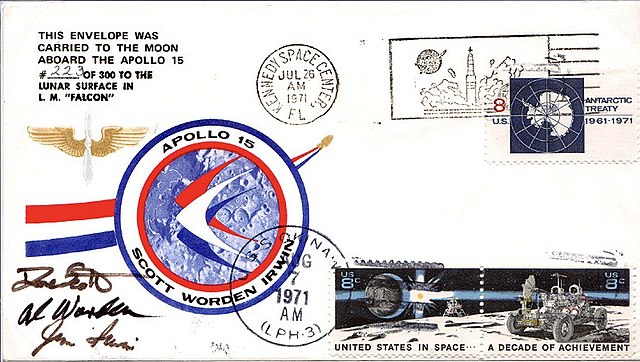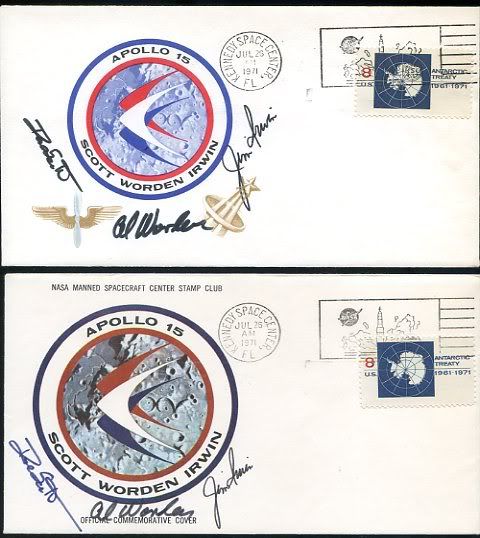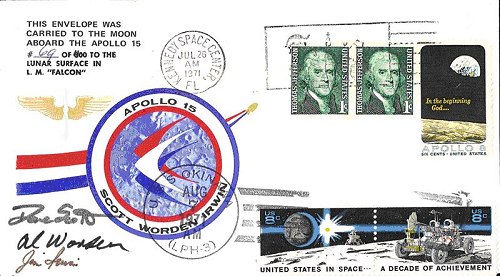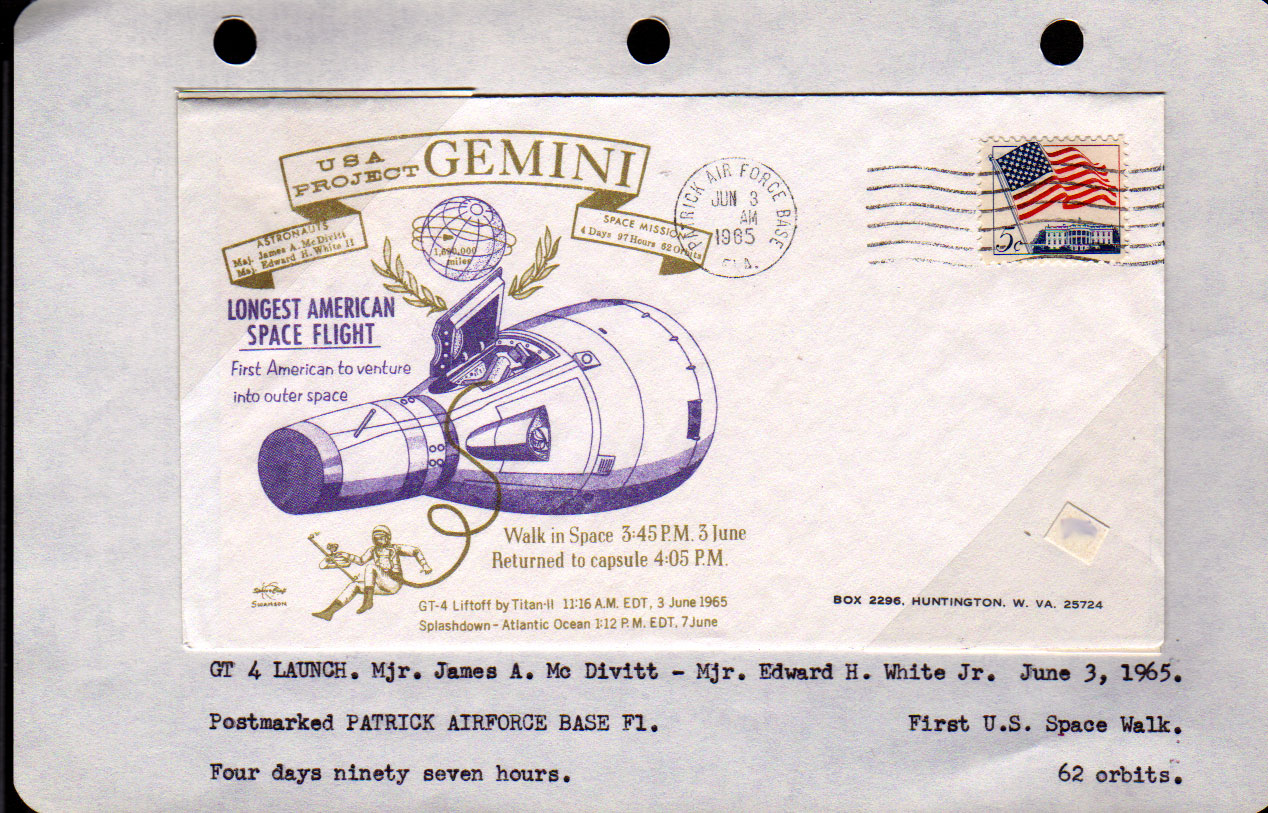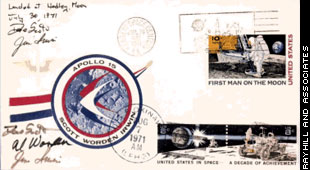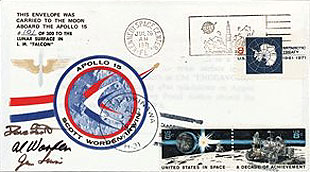Apollo 15 postage stamp incident
The 15 known as stamp scandal of Apollo incident made for stricter rules on what astronauts were allowed to take on board. After the space flight of Apollo 15 to the moon a few months later it turned out that the three astronauts David Scott, James Irwin and Alfred Worden had taken with him into space without permission envelopes that were later sold as collector's items.
Approved and unapproved envelopes
Middleman between the astronauts and the stamp trade was Walter Eiermann, an American of German origin, who worked at the Kennedy Space Center and was with many astronauts well known. To bring the idea, envelopes and stamps to the moon and then to sell, came from the German stamp dealer Hermann Walter winner Lorch ( Württemberg), the egg man had met in 1970.
In the spring of 1971 Eiermann first proposed Scott, Worden and Irwin later, take 100 envelopes to the moon for him. The astronauts insisted that these letters would be kept until the end of the Apollo program, and would then only offered privately. Eiermann then offered three times 7000 U.S. dollars in the form of savings accounts to. The three astronauts agreed and decided to take another 300 envelopes to the moon.
NASA astronauts were allowed to take some personal items on their space flights, which were not allowed to sell them later as souvenirs for personal gain. All items had to be previously listed and approved in a list.
When Apollo 15 launched on 26 July 1971 the astronauts led 243 approved envelopes with them, including one that was stamped on the Moon by Scott, and signed by Orville Wright envelope from the 1928. 144 more envelopes were also approved and transported by Worden.
100 of which were provided by F. Herrick, a friend Worden with an Apollo -15 special. In addition, envelopes were 87 on board, which were originally intended for the Apollo 12 flight, but were not taken. Irwin wore these envelopes, and gave them after the flight to Barbara Gordon, the wife of Apollo 12 pilot Richard Gordon. In addition, 398 unapproved by Scott were transported in a pocket of his spacesuit. They wore an Apollo 11 commemorative stamp of 10 cents, which was stamped on the departure day at the Kennedy Space Center. These envelopes were not smuggled on board, but packaged as well as the approved items by the ground staff. If these 398 envelopes have been on the list, so you would she have routinely also approved.
After landing
Apollo 15 landed on 7 August 1971 at the Pacific Ocean, the astronauts were brought aboard the USS Okinawa. There they stuck to both the 398 unauthorized as well as on the envelopes 144 approved two 8 -cent stamps, which were then stamped by the post office of the ship on the same day. Thus wore the envelopes date stamp of the start and Landetag the mission. Scott, Worden and Irwin signed these envelopes on the flight from Hawaii to Houston. 16 of the approved envelopes were damaged and discarded it. Was later added by hand " Landed at Hadley, moon, July 30, 1971 Dave Scott, Jim Irwin ," On the unauthorized envelopes. 100 envelopes were Eiermann promised, nor were given a typed certificate: " This is to certify that this envelope was on board the Falcon in the Hadley Apennine, Moon, 30 July to 2 August 1971" signed by a notary been.
On September 2, Scott sent the 100 agreed and certified envelopes to Eiermann, who was at that time in Stuttgart. Eiermann she handed on to the winner. Winner paid for an unknown sum and offered the envelopes public for purchase. Later he claimed to have not known that the envelopes were to be sold only after the end of the Apollo program. In November 1971, there were 99 of them already sold, learned at an average price of 4850 DM When Scott about it, he asked Eiermann phone aim is to prevent the further sale and return the remaining envelopes.
In the meantime, Eiermann had for each of the astronauts $ 7,000, according to some sources, $ 6,000, paid on German savings accounts. In February 1972, Scott, Irwin and Worden decided not to accept the money. Eiermann offered then, that each of the astronauts should receive a collector's album. After initial approval to this offer was dismissed in April 1972.
Worden had 28 of its remaining 128 envelopes to various friends, the remaining 100 to his friend Herrick, of which 28 are for Herrick himself, 12 for Herrick's son and 60 for storage. Herrick had sold some of his envelopes and thus taken $ 7,175.
The investigation
When NASA discovered in June 1972 by the affair, they confiscated both the remaining 298 envelopes as well as the 60 envelopes that had Worden store at Herrick, and opened a formal investigation.
NASA warned from the three astronauts and certified them " poor judgment ", where should " their actions affect future nominations ." Thus, the active space career for Scott, Worden and Irwin had ended. This was published on 15 September 1972 in a 18-page press release from NASA, which also contained new instructions: From now on only 12 items with a total weight of less than 230 g were per astronaut ( half American pound ) allowed. The items had to be approved and were in no way be used commercially by the head of NASA. The list of articles was published after the flight.
The Space Committee of the U.S. Senate also dealt with this matter. However, as no laws were violated, but only NASA internal instructions, there was no need for action. It turned out that in previous space flights unapproved articles had been carried.
Unauthorized Watches
During the investigation also came out that Scott had taken unapproved a watch and a stopwatch on board. Scott had promised a friend to test these two watches for the manufacturer as to their suitability for space flights. NASA gave the manufacturers of the watches not known, so that this does not should still get extra publicity. According to the minutes of talks it was a clock for the brand Waltham Watch.
Impact on the astronauts
Shortly after landing, the entire crew of Apollo 15 had been assigned as backup crew for the final flight to the moon Apollo 17. However, after it was revealed their connection with the stamp trade, Scott, Worden and Irwin were canceled on May 23, 1972 off the list.
Irwin retired from NASA on 31 July 1972. Been moved to the Ames Research Center in California, and left NASA in September 1975. Scott became head of the Dryden Flight Research Center at Edwards Air Force Base. He left NASA in October 1977.
Another astronaut, Jack Swigert said to have been also involved in a stamp trade winner. Although he had not taken any envelopes on board Apollo 13, after he had been taken into the team until a few days before the start, but he had allegedly signed stamp blocks for winners. For this case, there is apparently no official statement from NASA; there are rumors that Swigert had come for the Apollo -Soyuz flight in question, but was then rejected by NASA management.

